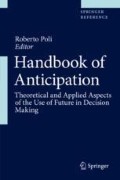Abstract
This chapter introduces a new concept, the anticipatory present moment (APM) which offers a way of integrating Rosen’s seminal model of the anticipatory system with post-Rosen developments in second-order cybernetics and the ontology of the present moment. The APM is a meta-model that enables systems thinking and futures thinking to be accommodated in a paradigm that transcends the contradiction between the science of systems based on evidence from the past with futures scenarios which derive from the psychology and mental models of practitioners trying to anticipate the future. As well as anticipatory systems theory, the APM arises from a transdisciplinary study including the phenomenology of time consciousness, boundary critique, scenario method, reperception as induction, and multidimensionality of time. The APM provides a conceptual framework which is stimulating fresh ideas about practices which support strategic decision-making.
Access this chapter
Tax calculation will be finalised at checkout
Purchases are for personal use only
References
Argyris, C., & Schon, D. (1978). Organisational learning. Reading: Addison Wesley.
Bennett, J. G. (1966). The dramatic universe (Vol. 4). London: Hodder and Stoughton.
Bergson, H. (1910). Time and free will: An essay on the immediate data of consciousness (trans: Pogson, F. L.). London: George Allen and Unwin.
Bohm, D. (1980). Wholeness and the implicate order. London: Routledge & Kegan Paul.
Boyd, E., Borgstrom, S., Nykvist, B., & Stacewicz, I. A. (2015). Anticipatory governance for social-ecological resilience. Ambio, 44(Suppl 1), 149–161.
Burt, G. (2010). Revisiting and extending our understanding of Pierre Wack’s the gentle art of re-perceiving. Technological Forecasting and Social Change, 77, 1476–1484.
Damasio, A. (2014). Remembering when. Scientific American, 23, 42–47.
Ferret, J. (2010). Anticipatory systems in physics. Foresight, 12(3), 30–37.
Fuerth, L., & Faber, E. M. H. (2012). Anticipatory governance – Practical upgrades: Equipping the executive branch to cope with increasing speed and complexity of major challenges. Washington, DC: Elliott School of International Affairs. Retrieved from http://forwardengagement.org/?option=com_content&view=article&id=6&Itemid=6.
Gell, A. (1992). The anthropology of time: Cultural constructions of temporal maps and images. Oxford: Berg.
Hodgson, A. (2013). Towards an ontology of the present moment. On the Horizon, 21(1), 24–38.
Hodgson, A. (2016). Time, pattern, perception: Integrating systems and futures thinking. PhD thesis, University of Hull.
Holland, J. H., Holyoak, K. J., Nisbett, R. E., & Thagard, P. R. (1986). Induction: Processes of inference, learning and discovery. Cambridge, MA: MIT Press.
Husserl, E. (1991). On the phenomenology of the consciousness of internal time (1903–1917). Dordrecht: Kluwer.
Ingold, T. (1999). From the transmission of representation to the education of attention. Department of Social Anthropology, University of Manchester.
Jacques, E. (1988). Requisite organization: A Total system for effective managerial organization and managerial leadership for the 21st century. Gloucester: Cason Hall.
Kineman, J. J., & Poli, R. (2014). Ecological literacy leadership. Bulletin of the Ecological Society of America, 95(1), 30–58.
Louie, A. H. (2010). Robert Rosen’s anticipatory system. Foresight, 12(3), 18–29.
Midgley, G. (2000). Systemic intervention; philosophy, methodology, and practice. New York: Kluwer.
Muller, K. H. (2016). Second-order science: The revolution of scientific structures (p. p37). Wien: Edition Echoraum.
Ogilvy, J. (2011). Facing the fold: From the eclipse of utopia to the restoration of hope. Foresight, 13(4), 7–23.
Poli, R. (2010). The many aspects of anticipation. Foresight, 12(3), 7–17.
Poli, R. (2011). Steps toward an explicit ontology of the future. Journal of Future Studies, 16, 67–78.
Poli, R. (2013). Overcoming divides. On the Horizon, 21(1), 3–14.
Rosen, R. (1985). Anticipatory systems: Philosophical, mathematical and methodological foundations. New York: Pergammon Press.
Scott, B. (2004). Scott 2nd order cybernetics: An historical introduction. Kybernetes, 33(9/10), 1365–1378.
Seligman, M. E. P., Railton, P., Baumeister, R. F., & Sripada, C. (2013). Navigating into the future or driven by the past. Perspectives on Psychological Science, 8, 119–141.
Smolin, L. (2013). Time reborn: From the crisis in physics to the future of the universe. London: Penguin.
Toffler, A. (1970). Future shock. New York: Random House.
Ulrich, W. (1994). Can we secure future-responsive management through systems thinking and design? Interfaces, 24(4), 26–37.
Umpleby, S. (2007). Reflexivity in social systems: The theories of George Soros. Systems Research and Behavioural Science, 24, 515–522.
von Foerster, H. (1979). Cybernetics of cybernetics. In K. Kippendorf (Ed.), Communication and control in society. New York: Gordon and Breach.
von Glasersfeld, E. (2001). The radical constructivist view of science. Foundations of Science, 6(1–3), 31–43.
Wack, P. (1985). Scenarios: The gentle art of re-perceiving. Harvard Business Review.
Weber, K., & Glynn, M. A. (2006). Making sense with intuitions: Context thought and action in Karl Weik’s theory. Organization Studies, 27(11), 163901660.
Author information
Authors and Affiliations
Corresponding author
Editor information
Editors and Affiliations
Rights and permissions
Copyright information
© 2019 Springer Nature Switzerland AG
About this entry
Cite this entry
Hodgson, A. (2019). Second-Order Anticipatory Systems. In: Poli, R. (eds) Handbook of Anticipation. Springer, Cham. https://doi.org/10.1007/978-3-319-91554-8_97
Download citation
DOI: https://doi.org/10.1007/978-3-319-91554-8_97
Published:
Publisher Name: Springer, Cham
Print ISBN: 978-3-319-91553-1
Online ISBN: 978-3-319-91554-8
eBook Packages: Religion and PhilosophyReference Module Humanities and Social SciencesReference Module Humanities

